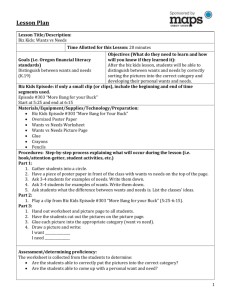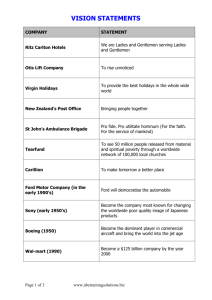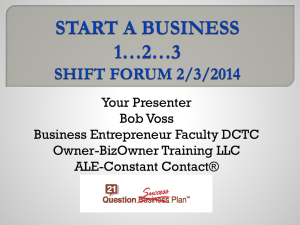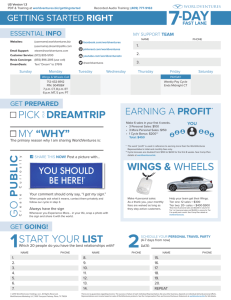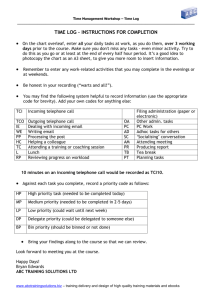(4.3 MB PPT) >
advertisement
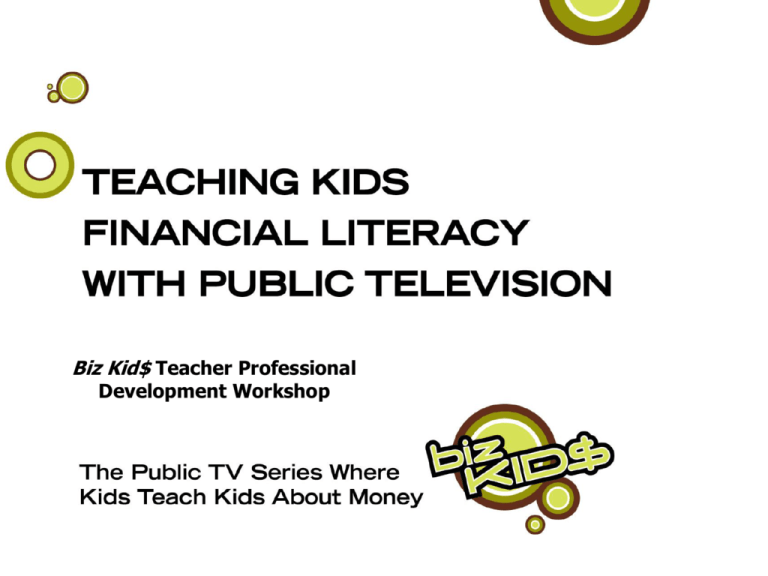
Biz Kid$ Teacher Professional Development Workshop Biz Kid$ Session Presenters • [Enter Name] is a [Title] for [Enter Organization]. [She/He] have been involved in [enter relevant activity] for [enter #] of years. • [Enter Name] is a [Title] for [Enter Organization]. [She/He] have been involved in [enter relevant activity] for [enter #] of years. • [Enter Name] is a [Title] for [Enter Organization]. [She/He] have been involved in [enter related activity] for [enter #] of years.. Session Goals • Explore the need for financial education • Discover how Biz Kid$ teaches kids about managing money and business • Identify Biz Kid$ classroom resources • Learn how to involve community partners in the classroom through Biz Kid$ Why financial education? • Aren’t today's kids pretty sophisticated? • The schools must teach about money …don’t they? • Families teach kids about managing money…don’t they…? What Do Kids Think?: Ages 13-18 • 80 % think "it's important to me to have a lot of money in my life" • 73% believe they'll be earning "plenty of money" when they're out on their own • 86% believe they will be on their own by 25 years of age • They project their average salary at: $145,500 based on their career interests Source: Charles Schwab & Co., Inc., Optimistic Teens May Need Financial Reality Check, Schwab Survey Shows, March 27, 2007. What Do Kids Think?: Ages 13-18 • 62% of believe they can deal with the adult financial world after high school • 63% say they are knowledgeable about money management, including budgeting, saving and investing • On finances < 50% feel knowledgeable about: – how to budget money (41%), – how to pay bills (34%), – how credit card interest and fees work (26%), – or whether a check cashing service is good to use (24%), – how income taxes work (14%) – what a 401(k) plan is (13%) Source: Charles Schwab & Co., Inc., Optimistic Teens May Need Financial Reality Check, Schwab Survey Shows, March 27, 2007. What Do Kids Know?: Ages 17-18 • 32% use credit cards & 53% use debit cards but 52% did not know that paying off a credit card more slowly will result in higher finance charges • 83% did not know that stocks are likely to yield higher returns than savings bonds, savings accounts and checking accounts over the next 18 years (even though there has never been an 18-year period where this wasn’t true) • 60% did not know that they could lose their health insurance if their parents become unemployed • 52.3% did not know they could check their credit report for free once a year at www.annualcreditreport.com/ Source: Statistics above are based on the results of the Jump$tart Coalition® for Personal Financial Literacy Survey (April, 2008.) 6,856 high school 12th graders in 40 states participated in the survey. What Do K-12 Teachers Say? • 80% think it is important to teach financial literacy in U.S. classrooms. • ~50% say they do teach some form of “Financial Literacy” to their students – Challenges include: lack of time, lack of state curriculum, requirements and lack of demand to teach it. • ~33% think their state has standards related to financial literacy, but nearly 75% believe their state should have academic standards for this subject. Source: Networks Financial Institute at Indiana State University, National K-12 Financial Literacy Qualitative & Quantitative Research, March/April, 2007, http://www.networksfinancialinstitute.org/SiteCollectionDocuments/NationalK12FinancialLiteracyStudy.pdf (Based on 650 K-12 teachers interviewed nationally) What Do K-12 Teachers Say? • According to teachers, financial literacy skills are lacking among their students and believe they need to be exposed to the basic financial skills they will need to function in society. • Topics teachers mentioned included: – – – – Balancing checkbooks Managing credit Making intelligent economic decisions Staying out of debt Source: Networks Financial Institute at Indiana State University, National K-12 Financial Literacy Qualitative & Quantitative Research, March/April, 2007, http://www.networksfinancialinstitute.org/SiteCollectionDocuments/NationalK12FinancialLiteracyStudy.pdf (Based on 650 K-12 teachers interviewed nationally) How about the schools? Source: Economic, Personal Finance & Entrepreneurship. Education in Our Nation's Schools in 2007, http://www.councilforeconed.org/about/survey2007/NCEESurvey2007.pdf from the Council for Economic Education. Finance Course in Schools Source: JumpStart Coalition for Personal Finance & Citi Education: http://www.jumpstart.org/state_legislation/index.cfm What About Parents? • Only 5% of adults learned about the money management in elementary or high school. • Less than half of people (48%) learned about money management from their parents, while 41% were self-taught or learned the hard way. • Source: Visa, Visa Back-To-School Survey Finds That Only 5% of Kids Learn Vital Life Skill of Money Management in Class, August 2007, http://www.practicalmoneyskills.com/english/presscenter/releases/081307.php What About Parents? • 52% of teens are eager to learn more about money management, but only 14% have taken a class on the topic - 35% would like to learn from their parents. • Only 19% of parents discuss back to school budgeting and only 22% make a list of back-to-school items to purchase. • 80% of parents see themselves as positive money role models for their kids, yet only a small percentage are taking advantage of dayto-day learning opportunities to arm their teens with practical money skills. • Only 48% of parents have discussed the importance of needs versus wants and more than one-third (36%) have not discussed back to school finances at all with their teens. • Source: Capital One, Capital One's Annual Back to School Survey Finds More Teens Eager To Learn About Money, Yet Parents Continue to Overlook Simple Opportunities to Talk Dollars and Cents, July 2007, http://phx.corporate-ir.net/phoenix.zhtml?c=70667&p=irol-newsArticle_print&ID=1026172&highlight Biz Kid$ to the Rescue… • Biz Kid$ is a fun, fast-paced public TV series where kids teach kids about money and business • Teaches with comedy & spoofs on movies &TV shows • Each show features young entrepreneurs and social entrepreneurs succeeding in business (handbag designer, podcast host, dog groomer, etc.) • Key Ideas: using credit wisely, saving, budgeting, investing, donating, and how to run a business Using Biz Kid$ Series Video • The 39 episodes have 4-year record (taping or DV-R) & educational use rights • The Biz Kid$ website has a zip code finder search to find when Biz Kid$ is airing on your public TV station • Episode video clips are available on the web. www.bizkids.com Video clips include financial concepts and young entrepreneur profiles Biz Kid$ Website Resources www.bizkids.com • Episode Curriculum, Games & Family Activities • Video Clips & Young Entrepreneur Profiles • “Dollar-A-Glass” Online Entrepreneur Game • Submit Your Biz Kid$ Story Idea • Zip Code Search: Look up when the series airs locally • Biz Kid$ Blog & “The Vault” E-Newsletter • Financial Tips Biz Kid$ Screening • Concept introduction through host skits, comedy sketches & profiles • Entrepreneur & social entrepreneur interviews in all episodes • Watch an episode and use the related curriculum lesson in a 2-day format • Less time: Watch some clips and use activities from the episode curriculum package. Biz Kid$ 5 Core Episodes • 5 episodes focus on key concepts in financial education • Curriculum packages available in English and Spanish at: www.bizkids.com • Each package includes: • • • • • • • -Biz Terms -Equipment and Materials Needed -Day One: Student Activity -Day Two: Student Activity -Discussion Questions -Handouts -Family Activity Sheet Focus of 5 Core Episodes Episode 104: What Can You Do With Money? • Focus: Understanding spending, saving, investing, and donating Episode 106: Taking Charge of Your Financial Future • Focus: Set financial goals and learn about opportunity cost Episode 110: How to Achieve Your Financial Goals • Focus: Achieve financial goals by tracking and controlling spending, and investing from a young age Episode 116: Budgeting Basics • Focus: Budget to gain control of spending and expenses Episode 123: Understanding Income and Expenses • Focus: Tracking income and expenses to follow cash flow Outreach Kits • Biz Kid$ Teacher Professional Development Kit: – Provides training and activity suggestions • Activities are described in next slides. • Biz Kid$ Booth Kit: – Provide display and activity ideas for an event • Available at: www.bizkids.com and at wxxi.org/tv/bizkids Biz Kid$ Vocabulary • Play Biz Term Bingo • Use Biz Terms by episode • Bingo boards and definition cards are supplied by episode • Use the Biz Terms to create Biz Kid$ crosswords & word searches. Biz Kid$ Career Module • Watch Biz Kid$ Career Exploration Episodes & Use Curriculum Packages • Watch Entrepreneur Profile Video Clips & Use “Get to Know the Biz Kids” Handout • Researching Careers Activity • Get to Know the Makers of the Dough – – – – Guest Speakers Class Field Trip to a Business “Learn About Careers” Day Job Shadowing in Small Groups Get to Know the Biz Kids • Watch the entrepreneur profile clips at bizkids.com • Complete Get to Know the Biz Kids Handout • Help students identify issues in starting and running a successful business Interview Business People • Invite guest speakers from the community • Complete Get to Know the Makers of the Dough Handout • Help students learn how to conduct an information interview “Learning About Careers” Day • Invite guest speakers from the community for a “Learn About Careers” Day. • Complete Get to Know the Makers of the Dough Handout • Help students learn how to conduct an information interview Business Field Trip • Help students learn how to conduct an information interview • Provide tours in an actual business environment Job Shadows • Small groups of students shadow a business person by visiting them and following them through part or all of a work day Biz Kid$ Business Development Module • Watch Biz Kid$ Business Planning Episodes & Use Curriculum Packages • Lemonade Stand Business Activities • Create Your Own Business Activities • Launch a Biz Kid$ Contest Biz Kid$ Dollar-A-Glass • Have students play “Dollar-A-Glass” game to learn entrepreneurial business concepts at www.bizkids.com • Have a class competition with high score chart • Watch the Biz Kid$ lemonade stand episodes and use related curriculum packages. • After playing the game, have student groups complete a business plan for a lemonade stand business. Assess what students are learning about business planning and strategy. • Extension activity: Have students share what they have learned with the class or do a presentation by having each group make a business pitch to “investors” (classmates). Biz Kid$ Create Your Own Business • • • • • • Decide on a business idea Create a Biz Kid$ Business Plan Make Your Own Resume Biz Cards Brainstorm a Marketing Poster “Market Me” Handout to Evaluate Advertising • Create an Advertisement Skit or Video • Make a Biz Brochure Launch a Biz Kid$ contest • Categories – – – – Youth who already have a business Youth who are planning a business Youth who have conducted a community service project Youth who are planning a community service/social entrepreneur project – Business poster contest for real or planned businesses – Best business pitch to a group of judges or mentors • Community Partnerships: – Provide prizes and judges – Mentors and guest speakers to assist students – Promotion & media coverage Example Community Biz Contest • Offer a similar event at your school. • WSIU Public TV in Carbondale, IL partnered with SIU Credit Union and University Mall in Carbondale • • Activities & Contest: Kids developed: – a business plan – an organizational chart – a name and logo – a plan for financing • Results: SIU Credit Union has received other requests to hold similar competitions in other market areas. This highly successful event introduced the series to hundreds of kids and more than 30 kids, ages 9-15, participated in the contest Source: Illinois Credit Union System Indepth Newsletter, Third Quarter, 2008. Community Example Biz Kid$ Entrepreneur Contest Biz Kid$ Materials Available • Available at www.bizkids.com and wxxi.org/tv/bizkids/ – – – – – – – – – Episode Descriptions Let’s Go Brochure: Quick Tips & Ideas for Kid Businesses Business Development Module Career Exploration Module Biz Term Bingo Curriculum by Episode with Activities PowerPoint Training Presentation with Sample Script Downloadable files needed for activities Outreach Kits: Teacher Professional Development Kit and Booth Kit How to get Biz Kid$ into class time • Look for thematic ties to what you already teach • Include finance, business, economics, math, English language arts, service learning and other subjects • Include “real world” authentic projects that use business and money management skills Theme: Career Exploration Activities: Career Module • Use short profiles from Biz Kid$ to learn about the kinds of questions to ask. • Guest Speakers • Job shadow groups and Business Field Trips • Mentors to assist with business planning • “Learn About Careers” Fair or business guest speakers series • Research careers using the library, Internet & through interviews Theme: English Language Arts Activities: – Vocabulary: Biz Terms & Biz Terms Bingo – Communications: Marketing/Presenting Yourself and Your Business • Create business plans, business cards, poster/ad, resume, business pitch – Present a business plan – Letter writing to set-up job shadowing, guest speakers and mentors Themes: Finance & Life Skills Financial Literacy, Personal Finance, Life Skills, Family & Consumer Sciences • Episodes and activities related to: saving, investing, donating, spending, budgeting, credit, credit reports, identity protection, paychecks, & smart consumer information • Guest speakers from credit unions, credit bureaus, chambers of commerce, etc. • Have students track expenses, set savings goals, encourage opening a saving account or 529. Theme: Mathematics Activities: – Money Math: Episode 202 deals exclusively with Money Math – Calculating %: interest rates, rates of growth: Do the math by hand and use financial calculators online. – Budgeting and tracking expenses: personal or business – Adding up totals and making change – Savings goals over time – Generate financial word problems Themes: Business & Entrepreneurship: Activities & Episodes Dealing with: – – – – – – – – – – • • • • Business plans Goals & Planning Goods & Services Credit, budgeting, tracking expenses Sales, persuasion & marketing Cash flow Personnel Management & Communications Risk Online Business Ethics Plan or create a classroom or school business Have teams create a business planning presentation Sponsor a business contest Sponsor a business fair to showcase businesses and business plans in the school Theme: Economics Specifics: • • • • • • Global economy and interconnections Needs vs. Wants Supply & Demand Financial Institutions & Markets Economic Cycles Green Economy Use the series to introduce and provide examples of these difficult concepts Theme: Economics Activities: • Create a day-to-day mini-economy in the classroom • Use Biz Kid$ to introduce the economic concepts • Students have jobs, and track “income” and “expenses” for classroom based activities Classroom Mini-Economy Examples Scholastic: http://content.scholastic.com/browse/unitplan.jsp?id=139 Example Classroom Implementation: http://hill.troy.k12.mi.us/staff/bnewingham/myweb3/mini-ecomony.htm Council on Economics Education: Sample lesson: http://www.ncee.net/resources/lessons/classroom_minieconomy.pdf Or purchase: http://store.ncee.net/classroom-mini-economy.html Theme: Service Learning Activities: – Use social entrepreneur interviews to inform kids of what they can do to give back. – Create project-based learning where kids raise money to give to a cause – Invite social entrepreneurs to be guest speakers to describe their work of running a business to “give back” and provide needed community services Biz Kid$ Themes 21st Century Skills: • Financial Literacy • Economic Education • Real world experience • Project-based learning • Communication skills Biz Kid$ Educational Options • Grade level or classroom curriculum • After School: Watch an episode. Use curriculum activities & games. Have kids plan & run businesses • Great opportunity for using business mentors Biz Kid$ teams launch their construction companies to plan & finance an engineering job Example: Biz Kid$ After School Project • Biz Kid$ is a great after school outreach • Example: Biz Kid$ Executive Producer, Jamie Hammond & WA Credit Union League members volunteered at WA Boys & Girls Clubs • Volunteers led 10 days of screenings, discussions and hands-on activities for 5 core episodes. • 6-12 year olds participated in the pilot. • Result: Biz Kid$ is now used weekly during homework/tutoring program called the Power Hour in eight Boys & Girls clubs in three counties in Washington State. Biz Kid$ Educational Options School sponsored activities: • Planning & showcasing youth businesses • “Learn About Careers” Day • Youth Business Pitches To Panel of Judges (Business Idol Contest) • Business Contests • Engage families: Biz Kid$ movie night or Biz Kid$ Bash with community partners to run activities and have information for families Families screening Biz Kid$ followed by a Q&A with community business partners Biz Kid$ Action Plan • Use Biz Kid$ in Your Classroom or Grade Level • Pick episodes that fit themes you teach • Offer a Training Session: – For Other Teachers, Parents, After School Staff – Youth Development Leader Training – Training for Kids (Clubs, After School, etc.) • • • • • Plan & Host a School Family Event Host a Biz Kid$ Booth at a School Event Host a Biz Kid$ Screening Launch a Biz Kid$ Contest Have Classes Interview Business People
